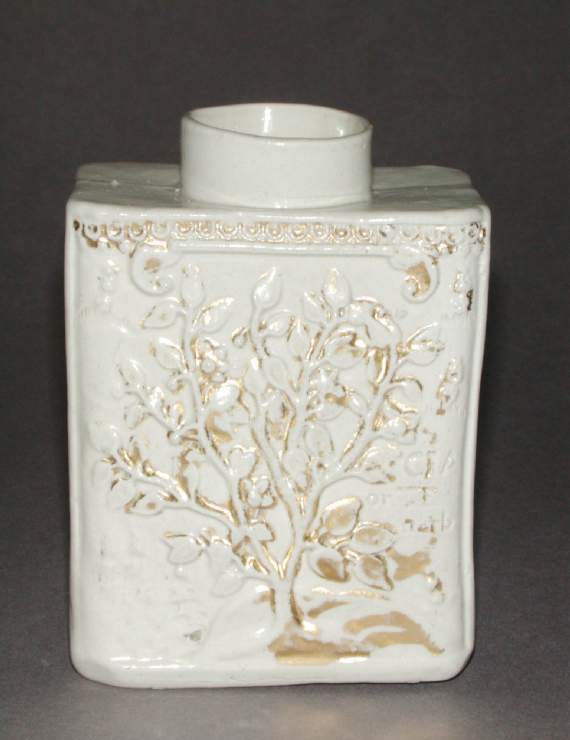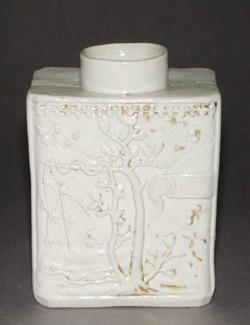Current Location: In storage
Maker(s)
Production:
Unidentified Staffordshire factory
Entities
Categories
Description
White salt-glazed stoneware, press-moulded with decoration in relief of a flowering tea shrub titled 'CIA or TE herb' and a vine titled 'Herb Teng', embellished with oil gilding of which little remains
Off-white stoneware, press-moulded with integral relief decoration, salt-glazed and oil-gilded. The rectangular caddy was moulded in two halves and has a recessed base and a cylindrical neck. One of the long sides is decorated with a tea plant, to the right of which is impressed 'CIA/or TE/herb'. On the other long side is a vine growing over the branch of a tree, on the right of which is a label inscribed 'H[erb Te]. The reliefs were originally embellished with oil gilding but little of this remains. The two short sides,the shoulder and the neck are undecorated.
Notes
History note: Mr George Stoner, London, from whom purchased for £11 on 17 December 1917 by Dr J.W.L. Glaisher FRS, Trinity College, Cambridge
Legal notes
Dr J.W.L. Glaisher Bequest
Measurements and weight
Depth: 5.4 cm
Height: 9.8 cm
Width: 7.7 cm
Acquisition and important dates
Method of acquisition: Bequeathed
(1928-12-07)
by
Glaisher, J. W. L., Dr
Dating
18th Century, Mid
George II
Circa
1750
-
1755
Note
The designs on the long sides were derived from 'An Appendix or Special Remarks taken at large out of Athanasius Kircher in his Antiquities of China'. in Johan Nieuhoff's An Embassy from the East India Company of the United Provinces to the Grand Tartar Cham, Emperour of China, 'Englished' by John Ogilby, Esq., London, 1669. One engraving has the same title as on the tea caddy; 'CIA or TE herbe'; the vine is titled 'Vimen Sinicum called TENG'. The fibres of the latter were used to make ropes, bee hives, mattresses, and other things. The tea shrub was also copied on an octagonal English delftware tea caddy in the Fitzwilliam Museum, C.1536-1928. The two designs also appear on caddies with dark green and yellow lead-glazes.
Small vertical firing cracks and faint vertical lines down the short sides show where the two moulded sides were joined.
School or Style
Oriental style
Components of the work
Surface
composed of
salt-glaze
Decoration
composed of
gold
Materials used in production
Stoneware
Techniques used in production
Press-moulding
: White stoneware, press-moulded, assembled, salt-glazed, and oil gilded on the reliefs, only remnants of which remain
Salt-glazing
Inscription or legends present
- Text: CIA or TE herb
- Location: On the tea shrub side
- Method of creation: Press moulded integrally with body
- Type: Inscription
Inscription present: almost illegible
- Text: H[erbe Te]
- Location: On the vine side
- Method of creation: Pres-moulded integrally with body
- Type: Inscription
References and bibliographic entries
-
Catalogue of the Glaisher Collection of Pottery and Porcelain in the Fitzwilliam Museum Cambridge
page(s): 84
-
Johann Nieuhoff's Embassy: An inspiration for relief decoration on English stoneware and eathenware
page(s): 176-7
-
Catalogue of the Collection of English Pottery in the Department of British and Mediaeval Antiquities and Ethnography of the British Museum
page(s): 185
-
English Saltglazed Earthenware. "Saltglaze" with the Notes of a Collector
-
Victoria and Albert Museum Department of Ceramics, Catalogue of English Porcelain, Earthenware, Enamels and Glass collected by Charles Schreiber Esq., M.P., and the Lady Charlotte Elizabeth Schreiber, and presented to the Museum in 1884, Volume II, Earthenware
page(s): 29
-
The Incomparable Art. English Pottery from the Thomas Greg Collection
page(s): 56
-
Creamware and other English Pottery at Temple Newsam House, Leeds
page(s): 31
-
English Pottery
page(s): 18
-
Early English and Continental Ceramics, 19th February 1991
page(s): 62
-
Important English Pottery, The Harriet Carlton Goldweitz Collection
page(s): 172-3
-
Delftware in the Fitzwilliam Museum
page(s): 292
Identification numbers
Accession number: C.563-1928
Primary reference Number: 75535
Old object number: 4232
Stable URI
Audit data
Created: Saturday 6 August 2011
Updated: Tuesday 17 December 2024
Last processed: Thursday 14 August 2025
Associated departments & institutions
Owner or interested party:
The Fitzwilliam Museum
Associated department:
Applied Arts





